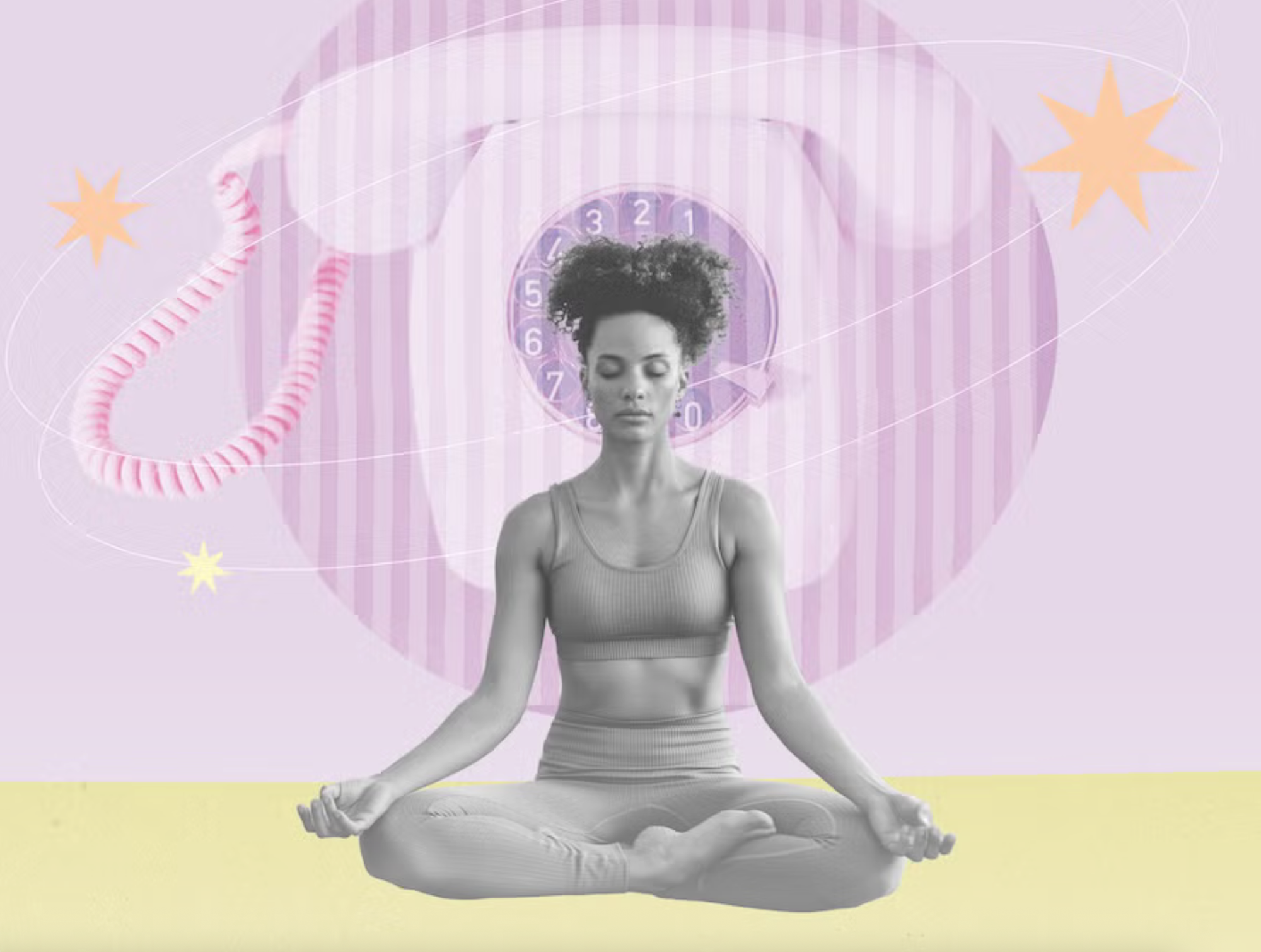Womens Health Magazine article, published 13 May 2025.

Why going offline is 2025's new wellness power move – and how to make it work for you
Lightning-fast wifi, on-demand entertainment and never being far from a phone charger have been the modern metrics of a life well-lived, both at work and home. So why are the best-connected women suddenly booking digital detoxes and scouring eBay for brick phones?
By Lauren Clark Published: 13 May 2025
For Daisy Morris, the most nourishing form of self-care doesn’t take place in Pilates. Nor does it involve being tucked up in Egyptian cotton before the 10pm news. Instead, it happens on her landing. For the past four years, the 32-year-old has deposited her phone here every evening; as of January, she deleted social media from her device entirely.
Far from being a technophobe, Daisy is the founder ofsocial media consultancy The Self Hood, which services Gucci, Apple and Meta. But when a professional life built on online foundations collided with the pandemic, warping work-life boundaries, screens became her go-to.
‘By night, I was utterly exhausted but struggling to sleep; by day, I was receiving voice notes in lieu of in-person catch-ups and would be so absorbed by TikTok that I’d miss my Tube stop,’ she describes of her constant phone use. When she became so anxious that she started having heart palpitations and losing hair, her GP referred her for further tests. Only one apparent cause appeared to connect the dots: Daisy was suffering from being chronically online.
Screen timeout
If it’s been less than 60 seconds since you last looked at your phone, you’re in good company. Almost 85% of those aged 16 and over now use a smartphone in the UK – and we aren’t just making phone calls.
Data from the screen-time-tracking app Opal reveals Brits spend an average of five hours and six minutes on devices daily – a figure that goes some way towards explaining the finding of a 2023 study by the Universities of Toronto, McGill and Harvard that around a third of adults are at risk of smartphone addiction. With women under 40 identified as the most susceptible, concern about how long you’re spending logged-on has become a personal endeavour.
‘Digital wellbeing once dwindled at the bottom of to-do lists, alongside drinking more water and pelvic-floor exercises,’ says Menka Sanghvi, a digital habits expert and co author of Your Best Digital Life. ‘Then there was a turning point, half a decade ago, when The Social Dilemma documentary drew attention to the potential negative impacts of the algorithmic arts that tech companies, such as Facebook, Google and Twitter, use to keep us scrolling.’
As we wise up to those tactics, going offline is having a cultural moment. Last year’s Oxford Dictionary word of the year was ‘brain rot’: the state of mental decay from gorging on low-quality online content. At the top of bestseller lists, Nir Eyal’s Indistractable, Anna Lembke’s Dopamine Nation and Cal Newport’s Digital Minimalism are all linked by the theme of rediscovering contentment in the real world. Mikey Madison, the 26-year-old Anora actress, recently picked up an Oscar without a social media account to her name.
But perhaps the surest sign that we’re (re)entering our analogue era is the industry that’s sprung up around it. Take the renaissance of ‘dumbphones’. Most phone companies never stopped selling the low-tech relics lying dormant in your junk drawer. But dumbphone-specific brands are launching faster than you can say ‘snake’, with the market projected to hit a £7.78bn valuation this year. Digital detox apps are predicted to create an industry worth £14.98bn by 2032, while the past 12 months witnessed a 50% rise in searches for ‘digital detox retreat’. So, if you felt a pang of envy watching The White Lotus cast hand over their devices for a week, could going analogue be a health habit worth plugging into?

Left to your own devices
For one, there’s growing awareness of the false economy of dropping 30 quid on a sound bath, only to subject your nervous system to rage-bait headlines and work notifications in the afterglow; research published in January* found almost half of 18- to 34-year-olds now view their online activities as being more disruptive than beneficial to their wellbeing.
Talilla Henchoz is at the heart of this vibe shift. As a fitness influencer with more than 250,000 followers, Talilla considered being logged-on a prerequisite for career success. It was Johann Hari’s Stolen Focus that led the 31-year-old to link her inability to concentrate in meetings and on tasks with soaring screen time. Since she started using Opal’s app blocking features to curb time on email, Instagram and WhatsApp, she’s shaved around two hours off her daily time online.
August Lamm is leaving no such margin for error. Like most members of Gen Z, life before the 29-year-old artist was handed a smartphone at 15 is hazy. She amassed a following of 170,000 as an art influencer on Instagram, where she’d book commissions, sell prints and work on partnerships. That is, until she was locked out of her account in 2022. Realising how dependent her professional and social life had become on social media, August purchased a dumbphone. Today, she campaigns against tech being the default.
‘I was told having [a smartphone] was as normal as brushing my teeth,’ she tells WH, with a palpable anger that smartphones were sold to her generation without a second thought. ‘I’m bitter that thousands of hours were taken away from me. Shouldn’t we know what it’s like to live without them before making a decision that we want them in our lives?’
Cue the women adopting a part-time approach. Some run ‘slow inboxes’, checking emails every 48 hours. Rosie Davies-Smith, founder of a PR software company, deleted emails from her phone after ‘inbox anxiety’ was affecting her daughters, aged four and five. ‘I would be stressed and hurry their bedtime just to get back to my inbox,’ admits the 37 year-old, who now only emails during work hours. As well as being more present at bedtime, she’s putting the time she isn’t spending scrolling to good use by doing some exercise and – on rest days – journalling.
'I feel more connected to the world around me'
One early adopter, 35-year-old fair fashion campaigner Venetia La Manna, coined #Offline48 in 2018 – a hashtag to encourage logging off at the weekend – and she remains deeply committed. She either turns her device off on Friday evening, or limits herself to WhatsApp to message family or to book transport online. ‘I’m stunned how much calmer and better-rested I feel by Monday morning. I no longer get FOMO because I feel much more connected to the world around me,’ she reflects. Another unexpected win is feeling less tempted to shop.
‘By stepping away, you realise how much we’re fed targeted ads,’ she says, noting how the current no-buy movement goes hand-in-hand with a desire to switch off.
Charging point
The trouble is, devices entice you back, says Dar Meshi, a cognitive neuroscientist and associate professor at Michigan State University, US. ‘Humans have evolved to always compute the value of certain actions,’ he explains of the process regularly used to weigh up whether going to the gym is worth the faff of changing bras.
‘At our core, we’re predisposed to desire social interactions and achieve social status.’ It’s why pangs of loneliness and FOMO feel intrinsically uncomfortable, and why you value online social interactions highly. ‘As technology has developed, it’s meant we can experience this [high-reward activity] 24 hours a day and on a greater scale than ever before.’
When you repeatedly go on certain apps – a fresh hit of dopamine released as you hunt down enjoyable content – you’re effectively hardwiring yourself to be unable to ignore your phone. ‘When you first make a decision to pick up your phone to check for notifications, your brain is making a deliberative decision – which takes a lot of energy,’ Professor Meshi explains. ‘When you do something over and over, your brain offloads deliberative decision-making (to save energy), turning it into habitual decision-making.’
So, because you’ve picked up your device from the table so many times – particularly in moments of boredom when there might be the reward of a message – it becomes automatic. ‘Problematic phone use’ – which can include social media, dating sites, online news and shopping – is something Catherine Carney has seen rising in her 23 years of practising psychiatry for the NHS and at the Delamere rehab clinic in Cheshire.
‘People experiencing anxiety, low self-esteem, loneliness or substance abuse are the most vulnerable,’ she explains, citing red-flag behaviours of irritability at not having phone access, disrupted sleep, a feeling of missing out and impacted relationships.
But in much the same way that anyone who drinks alcohol could benefit from cutting down, Professor Meshi believes the same is true for screen time. ‘People [are increasingly] seeing their relationship with their smartphone as the weak spot that undermines their other efforts,’ agrees Sanghvi. ‘It’s now normal to hear someone talking about how they manage their screen time, just as they would discuss working out – it’s a sign that you’re looking after yourself.’

Social hang-ups
That those most keen to go screen-sober are Gen Z and younger millennials perhaps points to a deeper issue at play. ‘Channelling the “good old days” when life seemed simpler,’ posits Jess Farnham. Last year, the 24-year-old marketing manager – who’s had a smartphone since she was 11 – released a YouTube documentary about trialling life with a dumbphone.
Like many people her age, Jess gets the appeal of watching re-runs of Friends – no phones in sight, just six people enjoying the kind of simple, carefree friendships that her generation crave. It’s a desire reflected in 26-year-old Adele Zeynep Walton’s Logging Off Club, which hosts monthly phone-free social events across London and southern England.
Even nightclubs, such as Manchester-based Amber’s, are placing stickers over phone cameras to enable partiers to let loose without digital inhibitions. Before you scour eBay for a piece of museum-grade tech, though, Professor Meshi is one of several experts to warn WH about a blanket vilification of smartphones.
‘They’re so important for safety,’ seconds Emma Palmer- Cooper, a research psychologist and lecturer at the University of Southampton. ‘After having my daughter, during a baby first-aid course, I was told my smartphone was the most powerful thing I could have on me if she suddenly fell poorly – you can ring someone for help immediately and search what to do while waiting,’ she explains. For Jess, the reassurance of other people being able to track her live location on Google Maps became apparent during her dumbphone experiment, when she felt on edge that family and friends had no idea where she was.
The consensus on a healthy middle ground is leaning towards using your phone as a tool; one where it’s unlikely you’ll be as tempted by Vinted as your internet banking, and one that helps you spin life’s plates. ‘It’s about actively cultivating habits that enhance cognitive function,’ says Lorenzo Cecutti, who is researching the impact of smart technology for his PhD at the University of Toronto. ‘When we delegate routine tasks to smartphones, it frees up mental resources – a process called cognitive offloading. That allows our brains to concentrate on more complex processes, such as critical thinking, decision-making and creativity, needed for larger life goals.’
Put simply, if you use your device to manage calendar appointments, set reminders or track health metrics, you can spend the extra headspace focusing on your career, sticking to healthy habits and spending time with loved ones.
'Do you put your phone down after messaging or start scrolling mindlessly?'
Tapping out
Of course, it’s easier said than done. ‘Identifying problematic use is about understanding how and why you’re using your phone,’ Dr Palmer-Cooper explains. ‘Are you picking it up out of necessity or habit? If you’ve set aside time to reply to messages, do you put your phone down afterwards or do you start scrolling mindlessly?’ Paying attention to how you feel after using your phone, she adds – refreshed or drained; informed or frustrated – can also offer clues as to whether your relationship with it is helping or hindering you.
Once you’ve established a need for change, the next step is identifying your personal patterns. ‘Knowing if you have a tendency to use your phone in ways that don’t benefit you, such as spending money or losing time when scrolling, means you can start to set boundaries with a timer or “buy later” list,’ recommends Dr Palmer-Cooper. Your schedule may work in your favour in this respect.
‘External constraints may require you to put down your phone,’ says Sanghvi, of non-negotiables such as driving, cooking, your children’s bedtime or working in an office. While you can rely on willpower, it’s what Dr Palmer-Cooper calls ‘a limited cognitive resource’. Meaning? If you’ve already swerved a 5pm americano and managed not to eat tomorrow’s lunch straight out of the pan at dinner, you don’t stand a chance against your phone.
But much like establishing a fitness routine and following a healthy diet, the best approach is the one that you’ll stick to. August is often told that using a dumbphone is inconvenient. ‘But I can’t think of anything less convenient than spending hours a day doomscrolling,’ she counters. For Daisy, the biggest challenges have been staying in the loop with both trends and friends. ‘There will be times when I’ll need to be more active online for work, but I’ve developed an understanding of the mental and physical signs of overuse, so I can catch them early,’ she describes, adding that the mantra ‘intention over attention’ helps her focus on the task at hand.
The biggest reward? A new appreciation for her offline life. ‘I’ve noticed that I romanticise little things more, I feel like I’m in less of a rush and that my days are fuller,’ she enthuses. ‘I also feel way more “in my own lane” and focused on my own milestones. I used to spend a lot of time feeling like I was behind in life, but I rarely feel that now.’ In fact, she’s very much ahead on this one.
5 ways to go from addicted to analogue
1/ Work with data
Via your phone’s Screen Time setting, find out exactly how much time you spend on your device and what on, advises Dr Carney. ‘Use that information as a starting point to work out where you can improve.’
2/ Set it to greyscale
‘The lack of colour, and one tone, makes it less interesting for the brain,’ says Professor Meshi. ‘Research says we’re more likely to choose salient things; if it’s all grey, nothing grabs your attention.’ For iPhone and Android, activate greyscale in the Accessibility section of the settings.
3/ Start small
‘Any amount of time away from your phone is beneficial for helping you feel more present, such as being immersed in a conversation,’ says Sanghvi. It might be one day a month, at mealtimes or the few hours before bed. ‘The core habit to cultivate is never to use any app on autopilot,’ she adds.
4/ Turn off notifications
‘Try this for everything, except emergency contacts, during working hours to avoid getting distracted,’ recommends Dr Palmer-Cooper. ‘Carve out a specific time to respond, such as at lunchtime.’
5/ Don't give up
‘It took me several attempts over several years to completely say goodbye to my smartphone,’ shares August. ‘People quit if they don’t feel the benefits almost immediately, but your brain has to have time to adjust.’
Photography: Getty Images / Adobe Stock / Unsplash / Paul Campbell / Kiwihug / Max Fuchs / Colton Jones